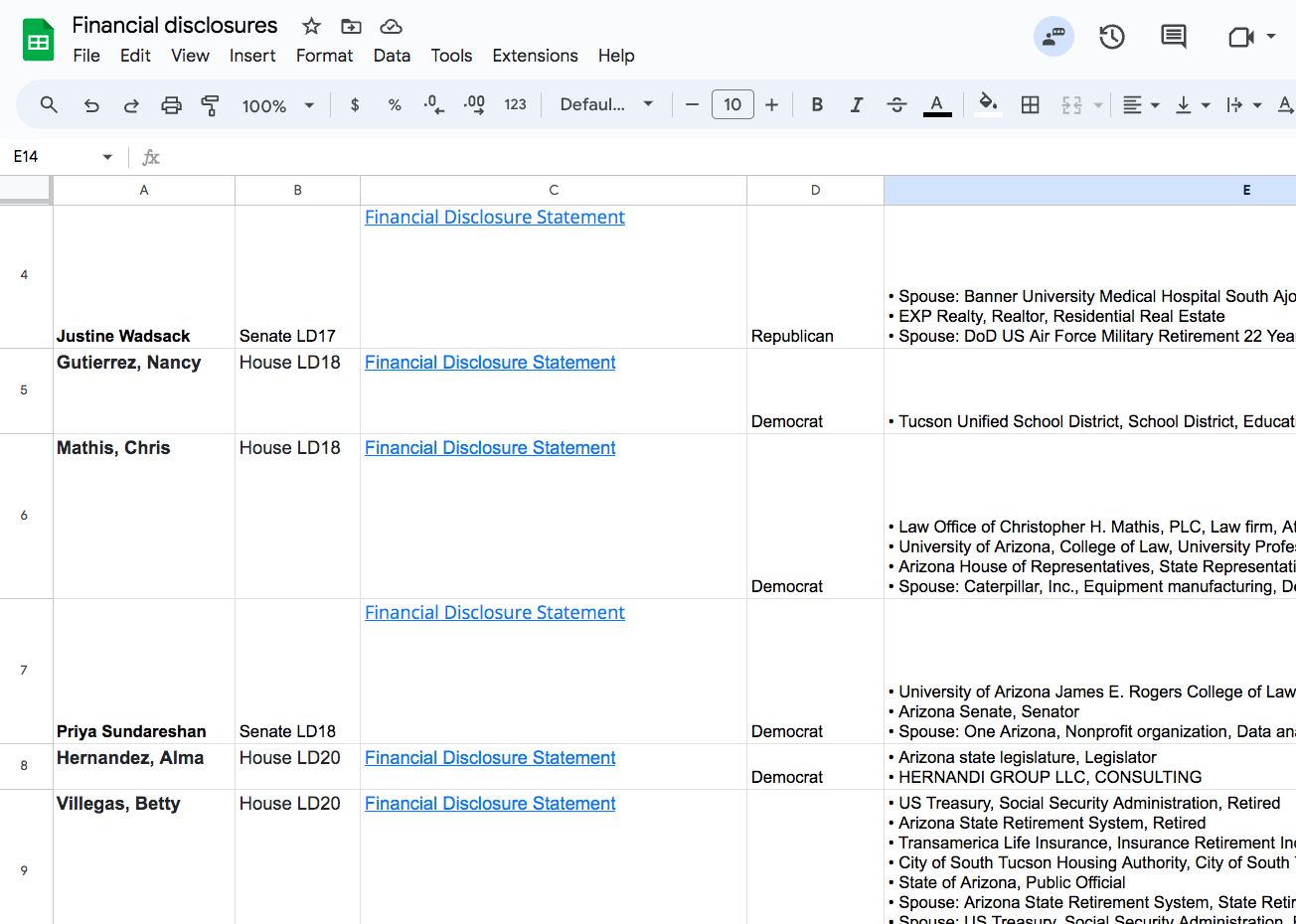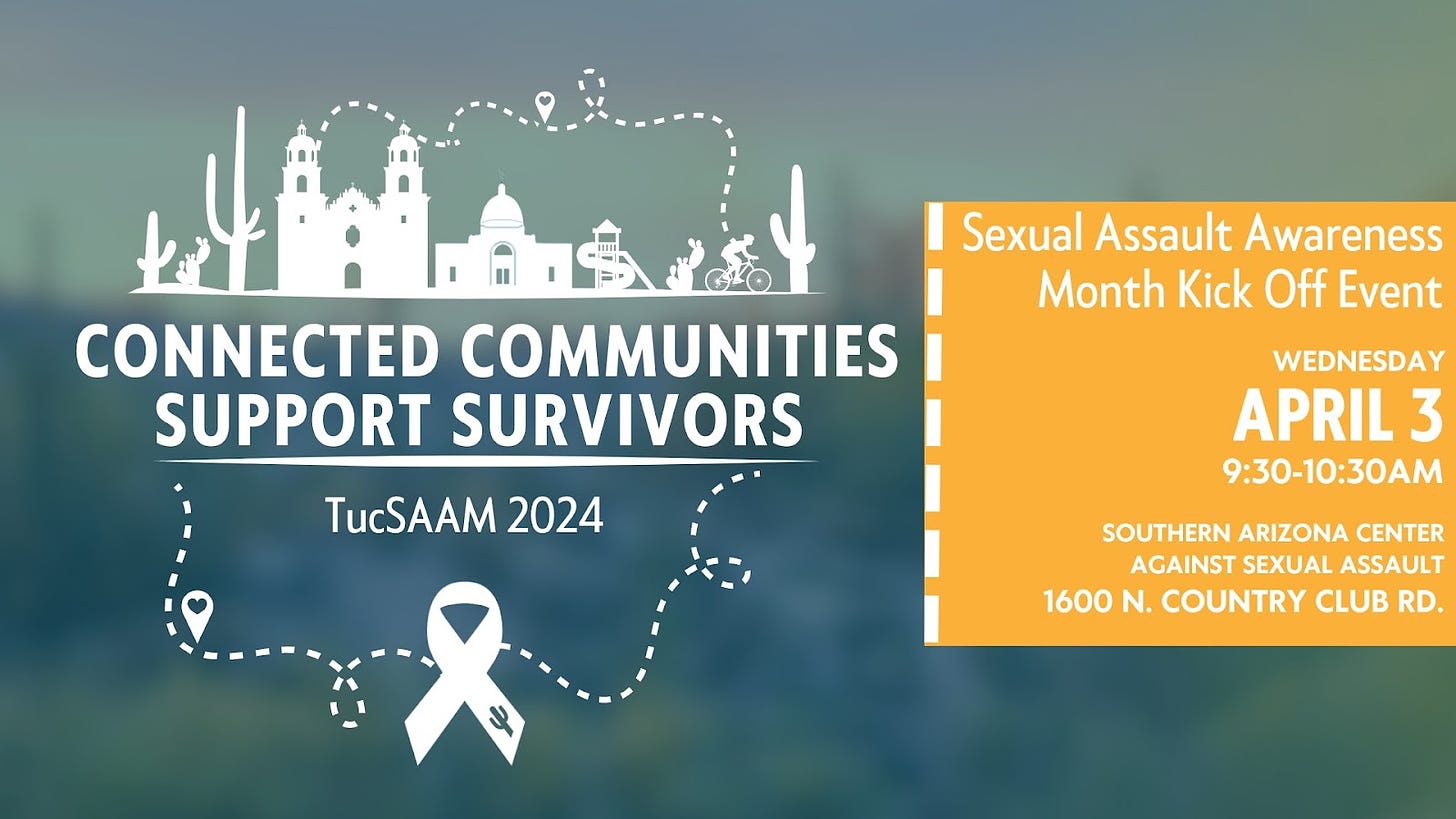The Daily Agenda: Peek behind the curtain
You hear lawmakers' names all the time … But what about their money? … Downtown's getting new security cameras.
What could be more Tucson than this? Our state lawmakers include a yoga teacher, a pest control specialist, a few lawyers, a real estate agent, a grassroots consultant, and a public housing director.
Their occupations are just one of the many things you can learn about lawmakers when you go through their financial disclosure statements. They’re required by law to tell us what they do for a living, besides working at the Legislature, along with where they invested their money, what property they own, and a dozen other financial aspects of their lives.
That way, the public can see if legislators have financial interests in laws they’re proposing, who they’re doing business with, and whether there’s any cause for concern.
The disclosures are good tools to check up on lawmakers. They’re powerful people and it’s healthy for them to raise the curtain on their finances every once in a while.
But the disclosures could be a lot better. As we’ve seen time and time again, state transparency laws only go so far.
This year, the reports were due in January, and most legislators met the deadline. But the Arizona Secretary of State’s Office didn’t publish them until March 13.
Plus, state law allows legislators to withhold all sorts of information. For instance, it looks like most legislators in Arizona don’t own their own home. But that’s likely because they’re not required to list their house as an asset, or its value. And a lot of them didn’t list their income as legislators for some reason.
Some lawmakers might be worth millions upon millions of dollars, which is something we’d like to know about them when they pass tax laws, for example. But you can’t tell because the maximum dollar amount is “$100,001+.” So on paper a person who made $10 million last year looks just like a person who made $110,000.
We’re pushing hard to get to “$100,001+” Help us get there with a paid subscription!
Not to belabor the point, but we just spent 14 hours (we counted) poring over these reports to get you a better look at your lawmakers.
Rather than put the financial information in a searchable format you could use to see how many legislators work in an industry like real estate (Sen. Justine Wadsack is just one of many, many legislators who work in that business and vote on housing laws), state officials posted dozens of PDFs that you can’t search or do much of anything with.
It’s aggravating, but the government moves slowly, especially when the people in charge might not want to shine a light on this type of information.
So we did it for them.
We gathered all the information for every lawmaker in the state and put it in a database, with links to the original documents.
For Tucsonans, you can see Rep. Alma Hernandez works at the Hernandi Group, a consulting firm, or that Rep. Cory McGarr works in pest control, or that Rep. Betty Villegas is involved in so many local organizations.
You can also see the paid trips they took as legislators. And there are a lot of them. Rep. Stephanie Stahl Hamilton went to a State Innovative Exchange event in Pescadero, California. Sen. Priya Sundareshan attended the SiX Accelerator Conference on Gender Justice in Denver. Wadsack went to an American Legislative Exchange Council event in Phoenix.
How much did those trips cost and who paid for them? They don’t have to tell us. The best we can say is they cost somewhere between $1,000 and $25,000.
But it’s not all about accountability. When you read the disclosure statements, you can start to see your lawmakers as real people.
Do you get a chill when you see the name of the student loan company you wrote checks to every month for years (or still do)? Well, those companies are all over these reports. Several local lawmakers, and a lot more statewide, are still sending in those monthly checks to student loan companies or the U.S. Department of Education.
So go ahead, geek out a little. Check out the database we made. Google “ONE annual conference” and see where Rep. Nancy Gutierrez went last year or what people were talking about at the Hazlitt Summit that McGarr attended.
We’ll be doing it, too.
Funding safer streets: The Rio Nuevo board will foot the bill to install new security cameras in downtown Tucson, at the request of the Tucson Police Department, the Arizona Daily Star’s Gabriela Rico writes. The cameras, which will cost $40,000, will capture license plates of people who are driving dangerously on downtown streets or sidewalks. The board also extended its current contract for off-duty police officers to patrol the area at the rate of $60,000 per month for the next year.
Prioritizing pets: A Florida-based urgent care clinic for pets is opening its first location in Tucson this week, KVOA’s Katie Burkholder reports. UrgentVet-Tucson will be located at 107 North Pantano Road and will provide after-hours pet care for pet parents in need. The clinic will treat mild illnesses and minor injuries during nights, weekends and holidays at rates they say are more affordable than emergency vet hospitals. Staff will offer same-day care for conditions including vomiting, diarrhea, limping, itching, coughing, not eating, minor wounds and back pain.
Breaking records: New federal data shows that the number of migrants apprehended by the Border Patrol in the Tucson’s Sector continues to increase, including the number of families and children, Arizona Public Media’s Danyelle Khmara reports. The more than 140,000 people apprehended in February represented a 13% increase in apprehensions from the month before, with the Tucson Sector continuing to have the highest number of unauthorized crossings and the highest number of families and unaccompanied minors.
Saying her piece: Tucson-area state Rep. Alma Hernandez defended her decision to visit Israel in the middle of the legislative session in an opinion piece in the Star, saying the group of 17 lawmakers on the trip “had no choice” but to go now. The group visited with the families of Israelis held hostage by Hamas, with Hernandez pointing out that five months into the conflict, there are still more than 130 people in captivity.
“We had to go because even though we live in Arizona, we have young people who don’t know what the Holocaust is or why anti-Semitism isn’t merely a Jewish issue,” Hernandez wrote.
Poetry partnership: The annual Haiku Hike is back in downtown Tucson through June, featuring 20 pieces exploring the theme of “serenity” selected from more than 2,000 submissions, the Tucson Sentinel’s Bianca Morales writes. The poems are printed on acrylic signs and placed in flower pots in the city center, with an interactive map available on the Downtown Tucson Partnership website. The urban hike is a collaboration between the partnership and the University of Arizona Poetry Center, with 1,385 of the 2,069 submissions coming from Tucson residents. The submissions represented 29 states and 27 countries.
Seeking feedback: The Town of Sahuarita surveyed residents about their support for a bond package officials are eyeing for the November ballot, with nearly 2,000 people weighing in, the Green Valley News’ Jorge Encinas writes. The survey covered nine potential General Obligation Bond projects, including a police building expansion, rec center, trails development, public pistol range and more. The police project, rec center and trails development were respondents’ top three choices. An expansion to town hall, the pistol range and an additional dog park received the least amount of support.
190: Every time we ask you all to respond to our reader survey, more of you come through. Thank you! We had nine more responses yesterday, bringing the total so far to 190. Please take a minute or two and fill it out. It’s a huge help to us.










Since you have brought up financial disclosure, I've been curious if any of the Mayor and Council have quit their second jobs since getting the very substantial raise. It's been said for years that it should be treated as a full time job, are they doing that?
Thanks for looking at those stupid disclosure forms that don’t disclose much. When I was a Legislator, I was surprised how little was on that form. Don’t get me started on PDFs. There are far too many governmental websites that depend on PDFs. There should be more downloadable data in Excel. Several years ago, I downloaded and analyzed years of maternal and child health data. When I met with ADHS and showed them my findings, they asked where I got the data. They were surprised to learn I got the data in Excel from their website. I’ve tried to find the more recent years of the same data and can’t. Yes! More transparency in government. Did you ever look at the Legislators’ bios on azleg? Most Republicans don’t provide any personal information or background.